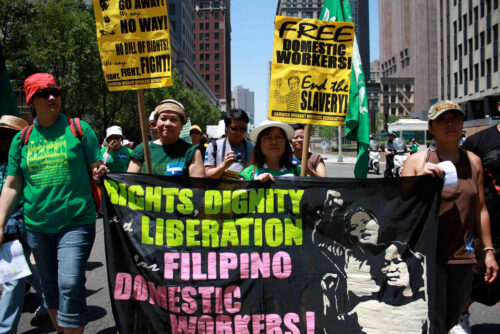Domestic Work in High-Income Households
Two trends have come together in global cities over the last twenty years to produce a repositioning of what it means to be a domestic worker in high-level professional households. One is the growing demand for female professionals, and the other is the strong preference among both male and female professionals for living in the city, given their long hours and very demanding responsibilities in the workplace.
The result is a proliferation of what I like to refer to as “the professional household without a ‘wife.'” The absence of the ‘wife’ happens precisely at a time when professional households need to function like clockwork, much like the infrastructure in global cities, because they are crucial to the functioning of globalized sectors. Indeed, these types of households should be reconceptualized as part of that infrastructure. Here the low-wage domestic worker is actually maintaining a strategic infrastructure, which has the effect of changing the valence of this work.
The demands placed on the top-level professional and managerial workforce in global cities are such that the usual methods for handling household tasks are inadequate. Most of the research on this subject has focused on the poor working conditions, exploitation, and multiple vulnerabilities of household workers. 1 These conditions are undeniable. But, analytically, what matters here is the strategic importance of well-functioning professional households for the leading globalized sectors in these cities and, hence, the importance of this new type of serving class.
Immigrant and minoritized women are a favored source for this type of work. Theirs is a mode of economic incorporation that makes their crucial role invisible. Being immigrant or minoritized citizens breaks an important connection: the nexus between being workers with an important function in the advanced global economy and the opportunity to become an empowered workforce. Historically, workers in major growth sectors were able to organize and gain ground. In this sense, we can say that being an ‘immigrant woman’ becomes the systemic equivalent of the offshore proletariat with its lack of power and lack of political visibility.
The fact that domestic work in high-level professional households is increasingly recognized as important for busy professionals and hence their firms’ households, is suggested by the fact that it has become one growth sector of global staffing companies—even though it remains lowly paid. Some of these companies have expanded into household work to help the transnational professional workforce. For instance, Kelly Services, a Fortune 500 services company in global staffing, which operates offices in 25 countries, now has added a home care division, which provides a full range of help. It is particularly geared to people who need assistance with daily living but also for those who lack the time to take care of the household, which in the past would have been the responsibility of the ‘mother/wife’ figure. 2 More directly pertinent to the professional households discussed here is a growing range of global staffing organizations whose advertised services cover various aspects of daycare, including dropping off and picking up, as well as in-house tasks, from child minding to cleaning and cooking. 3 One international agency for nannies and au pairs, EF Au Pair Corporate Program, advertises directly to corporations, urging them to make the service part of their employment offers to potential employees to help them address household and childcare needs. Increasingly the emergent pattern is that the transnational professional class can access these services in the expanding network of global cities among which they are likely to circulate. 4
- There is a growing scholarship examining the return of the so-called “serving classes” in all the global cities around the world, made up largely of immigrant and migrant women. See: Barbara Ehrenreich and Arlie Hochschild, Global Woman: Nannies, Maids, and Sex Workers in the New Economy (New York: Metropolitan Books, 2003); Rhacel Salazar Parreñas, Ed., Servants of Globalization: Women, Migration and Domestic Workers, (Stanford, CA: Stanford University Press, 2001); Natalia Ribas Mateos, The Mediterranean In The Age Of Globalization: Migration, Welfare, And Borders (Somerset, NJ: Transaction, 2005); Pierrette Hondagneu-Sotelo. Doméstica (Berkeley: University of California Press, 2005).[↑]
- Homecare services include assistance with bathing and dressing, food preparation, walking and getting in and out of bed, medication reminders, transportation, housekeeping, conversation and companionship. While less directly related to the needs of high-income professional households, it is the case that many of these tasks used to be in the care of the typical housewife of the global north[↑]
- Very prominent in this market are the International Nanny and Au Pair Agency, headquartered in Britain; Nannies Incorporated, based in London and Paris; and the International Au Pair Association (IAPA) based in Canada.[↑]
- See chapter 7 of Sassen (2001), and Heather Hindman, “Outsourcing Difference: Expatriate Training and the Disciplining of Culture,” in Deciphering the Global: Its Scales, Spaces and Subjects, Saskia Sassen, Ed. (New York and London: Routledge, 2007): pp. 153-176.[↑]



